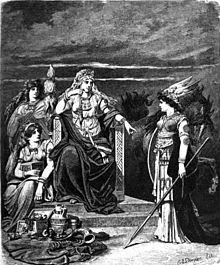Hlín

In Norse mythology, Hlín (Old Norse "protectress"[1]) is a goddess associated with the goddess Frigg. Hlín appears in a poem in the Poetic Edda, compiled in the 13th century from earlier traditional sources, the Prose Edda, written in the 13th century by Snorri Sturluson, and in kennings found in skaldic poetry. Hlín has been theorized as possibly another name for Frigg.
Attestations
In the Poetic Edda poem Völuspá, Hlín receives a mention regarding the foretold death of the god Odin during the immense battle waged at Ragnarök:
In chapter 35 of the Prose Edda book Gylfaginning, Hlín is cited twelfth among a series of sixteen goddesses. High tells Gangleri (earlier in the book described as King Gylfi in disguise) that Hlín "is given the function of protecting people whom Frigg wishes to save from some danger." High continues that, from this, "someone who escapes finds refuge (hleinar)."[3] In chapter 51, the above-mentioned Völuspá stanza is quoted.[4] In chapter 75 of the book Skáldskaparmál Hlín appears within a list of 27 ásynjur names.[5]
In skaldic poetry, the name Hlín is frequent in kennings for women. Examples include Hlín hringa ("Hlín of rings"), Hlín goðvefjar ("Hlín of velvet") and arm-Hlín ("arm-Hlín"). The name is already used frequently in this way by the 10th-century poet Kormákr Ögmundarson and remains current in skaldic poetry through the following centuries, employed by poets such as Þórðr Kolbeinsson, Gizurr Þorvaldsson and Einarr Gilsson.[6] The name remained frequently used in woman kennings in rímur poetry, sometimes as Lín.[7]
In a verse in Hávarðar saga Ísfirðings, the phrase á Hlín fallinn ("fallen on Hlín") occurs. Some editors have emended the line[8][9] while others have accepted the reading and taken Hlín to refer to the earth.[10]
Theories
Andy Orchard says that in Völuspá, Hlín appears to be just another name for Frigg, and adds that "the numerous occurrences of the name in skaldic poetry in poetic periphrases or kennings for women do nothing to dispel the confusion."[1] Rudolf Simek agrees that Hlín seems to appear as another name for Frigg in Völuspá, and that in skaldic poetry Hlín was a well-known mythological figure by the 10th century. Simek states that Hlín is likely simply another name for Frigg, and that Snorri "misunderstood her to be a goddess in her own right in his reading of the Völuspá stanza."[11]
However, in the same work, Rudolf Simek also says that the goddesses Sága, Hlín, Sjöfn, Snotra, Vár, and Vör should be considered vaguely defined figures who "should be seen as female protective goddesses" that are all responsible for "specific areas of the private sphere, and yet clear differences were made between them so that they are in many ways similar to matrons."[12] John Lindow observes that if Hlín is indeed Frigg, then this means that Hlín's "second sorrow" in Völuspá is the death of Odin, the first being the death of Baldr.[13]
Notes
- ^ a b Orchard (1997:86).
- ^ Dronke (1997:21).
- ^ Faulkes (1995:30).
- ^ Faulkes (1995:55).
- ^ Faulkes (1995:157).
- ^ Finnur Jónsson (1931:263).
- ^ Finnur Jónsson (1926-28:175,245).
- ^ Gísli Brynjúlfsson (1860:174).
- ^ Finnur Jónsson (1912-1915a:191), (1912-1915b:181).
- ^ Björn Karel Þórólfsson and Guðni Jónsson (1943:341).
- ^ Simek (2007:153).
- ^ Simek (2007:274).
- ^ Lindow (2001:177).
References
- Björn Karel Þórólfsson and Guðni Jónsson (1943). Vestfirðinga sǫgur. Reykjavík: Hið íslenzka fornritafélag.
- Dronke, Ursula (Trans.) (1997). The Poetic Edda: Volume II: Mythological Poems. Oxford University Press. ISBN 0-19-811181-9
- Faulkes, Anthony (Trans.) (1995). Edda. Everyman. ISBN 0-460-87616-3
- Finnur Jónsson (1931). Lexicon Poeticum. København: S. L. Møllers Bogtrykkeri.
- Finnur Jónsson (1926–28). Ordbog til de af samfund til udg. af gml. nord. litteratur udgivne rímur samt til de af Dr. O. Jiriczek udgivne bósarimur. København: J. Jørgensen & Co.
- Finnur Jónsson (1912–1915). Den norsk-islandske skjaldedigtning A: Tekst efter håndskrifterne, 2 vols. B: Rettet tekst, 2 vols. København: Gyldendal.
- Gísli Brynjúlfsson (1860). Hávarðar saga Ísfirðings. Kjøbenhavn.
- Lindow, John (2001). Norse Mythology: A Guide to the Gods, Heroes, Rituals, and Beliefs. Oxford University Press. ISBN 0-19-515382-0
- Orchard, Andy (1997). Dictionary of Norse Myth and Legend. Cassell. ISBN 0-304-34520-2
- Simek, Rudolf (2007) translated by Angela Hall. Dictionary of Northern Mythology. D.S. Brewer. ISBN 0-85991-513-1
